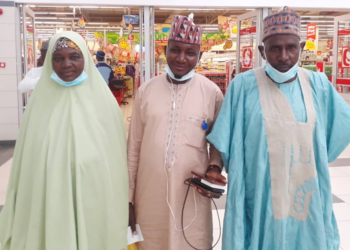
PRESS RELEASE
Director General and Chief Executive Officer of NIMC, Abisoye Coker-Odusote
Introduction and Overview
The National Identity Management Commission (NIMC) plays a pivotal role in maintaining the National Identity Database (NIDB) and ensuring that Nigerians are securely enrolled and recognized for various public and private services. However, prior to the appointment of Engr. Abisoye Coker-Odusote as the Director General (DG) and Chief Executive Officer of NIMC on August 24, 2023, the commission faced numerous challenges that hampered its effectiveness in delivering on its mandate.
1.1 Some of the key challenges included:
• Slow Enrollment Processes: Limited capacity and outdated infrastructure significantly slowed down the NIN registration process, causing long waiting times for citizens at enrollment centers across the country.
• Identity Fraud and Security Concerns: Widespread reports of identity theft, extortion by unscrupulous agents, and the proliferation of fraudulent websites claiming access to NIMC’s database created a critical need for better cybersecurity measures.
• Backlog and Operational Inefficiencies: Several operational bottlenecks, including an outstanding two-year backlog for payments to Front-End Partners (FEPs), administrative inefficiencies, and inadequate staff management, undermined the commission’s ability to serve the public effectively.
• Public Skepticism and Low Confidence: Due to suspicious cases of data security breaches and poor service delivery, there was a general lack of public confidence in the NIMC, reducing the adoption of NIN as a critical identification tool.
In response to these challenges, Engr. Abisoye Coker-Odusote, upon assuming office, immediately took decisive actions to revitalize the commission by focusing on a five-point agenda aimed at addressing these key issues. Her leadership has not only restored order but also laid the foundation for a more effective and transparent NIMC. This report outlines the DG’s key achievements in her first year, mapping them to the five-point agenda that has driven her transformative leadership.
• Achievements in Line with the Five-Point Agenda
2.1 Increase Enrollment
Before her appointment, NIMC faced significant delays and inefficiencies in the NIN enrollment process due to insufficient equipment and an overwhelmed system. Many citizens experienced long queues and a lack of access to enrollment centers, further exacerbated by unregulated third-party agents who extorted citizens.
2.1.1 Achievements
• Deployment of over 800 mobile enrollment devices: This strategic initiative has expanded the enrollment capacity across Nigeria, helping to register an additional over 13 million Nigerians, bringing the total number of registered NINs from 100 million to 113, 163, 868 as at 21st Nov. 2024.
• Revalidation of Front-End Partner (FEP) licenses: This has ensured that only certified partners manage the enrollment process, reducing fraudulent activities and streamlining operations.
• Creation of territorial offices: This move has enhanced the oversight of staff and operations, ensuring smoother administrative processes and more effective management of enrollment activities across the country.
• Launch of the Self-Service Mobile App and Web Modification App: These self-service platforms allow citizens to update their records and enroll in a more user-friendly, accessible way without the need to visit enrollment centers.
2.1.2 Impact
These steps have significantly reduced long waiting times, increased access to enrollment services nationwide, and brought the NIMC closer to achieving universal enrollment coverage.
2.2 Harmonization and Integration of Data Across All Agencies
A key priority for the DG was to address the fragmented approach to identity management across various government agencies, which led to duplication and inefficiencies in data handling.
2.2.1 Achievements
• Successful integration of NIN with the Nigerian Immigration Service (NIS): This ensures that immigration processes are directly linked with the NIN database, enabling seamless verification for passport issuance.
• Inter-agency collaboration with the Federal Inland Revenue Service (FIRS): This integration supports data harmonization, making the NIN the foundational identifier for tax and financial records.
• Technological upgrades: The NIMS Middleware has been improved to automate date of birth modifications and introduce new workflows, including amputee verifications, to enhance service efficiency.
• Monitoring and evaluation systems: These systems have been implemented across enrollment centers to understand challenges faced by staff and enrollees, ensuring better data integration and management.
2.2.2 Impact
These initiatives have significantly improved inter-agency cooperation, enhanced data security, and established the NIN as a critical tool for identity verification across multiple sectors.
2.3 Issuance and Activation of GMPC/Use of Applets
The issuance of the General Multipurpose Card (GMPC) had stalled in previous years, limiting its use in facilitating financial inclusion and identity verification.
2.3.1 Achievements
• Relaunch of the GMPC: The DG reactivated the issuance of the GMPC and included applets that enable secure payments and access to services directly via the card.
• Applets Integration for payments: With the inclusion of applets on the GMPC, citizens can now perform financial transactions more easily, enhancing their access to financial services.
• Expansion of diaspora enrollment centers: Over 200 new centers have been established globally, this will further ensure that Nigerians abroad can also access the GMPC and other identity services.
• NIMC Mobile Wallet ID: A significant milestone is the introduction of the NIMC Mobile Wallet ID, a cutting-edge mobile wallet app designed to allow residents to manage their digital identities. This app enables residents to scan and store their physical IDs as digital copies, customize information shared with enterprises, perform biometric (facial) authentication, and manage their IDs across multiple devices.
2.3.2 Impact
These measures have provided Nigerians with a robust tool for identity verification and financial transactions, improving access to essential services.
2.4 Access to Services to Aid Financial Inclusion Through G2P Payments
Limited access to financial serviceshad been a significant issue, especially in rural areas and among marginalized groups. Prior to the DG’s appointment, the NIN’s potential as a tool for financial inclusion had not been fully realized.
2.4.1 Achievements
• Rice Palliative Initiative Using NIN: In response to the economic challenges faced by many Nigerians, the DG initiated a rice palliative distribution program using the NIN for verification and allocation, ensuring fair and transparent access to relief packages.
• Student Loans Initiative with NELFUND: The NIMC played a pivotal role in the implementation of the Nigerian Education Loan Fund (NELFUND), where the NIN was used as a primary identifier for students applying for loans. This ensures that loans are allocated to deserving candidates and enhances financial inclusion for students.
• Seamless Verification Services: The DG also ensured the availability of seamless verification services for financial institutions, helping to bring more Nigerians into the formal financial system. The introduction of the High Availability NIMC Verification Service (HA-NVS) further streamlined access to identity data for service providers, bolstering financial inclusion.
2.4.2 Impact
These achievements have directly contributed to financial inclusion, especially in remote areas, by ensuring that NIN is linked to essential financial services.
2.5 Increase Public and Private Sector Participation in Using NIN as the Foundational Data for Identification
Before the DG’s tenure, there was a lack of widespread enforcement and public awareness regarding the mandatory use of NIN, limiting its application in both public and private sectors.
2.5.1 Achievements
• Enforcement of NIN for SIM Registration: The NIMC worked closely with telecoms to enforce the NIN-SIM linkage, ensuring that all mobile phone users are registered with their NIN, reducing fraud and improving national security.
• Public Awareness Campaigns: Through aggressive monitoring, evaluation, and awareness campaigns, the DG has significantly increased the public’s understanding of the importance of NIN as a foundational identity document.
• Private sector engagement: The NIMC has collaborated with various private entities, including FAAN, TLS, VFS, and other organizations, to increase the use of NIN in their operations.
• Collaborations with State Governments: The DG worked closely with state governments to integrate the NIN with their residents’ registration efforts, ensuring a more comprehensive database for national planning and service delivery.
• Increased Awareness and Enforcement of NIN Usage: The DG’s tenure has seen aggressive campaigns to raise public awareness on the importance of the NIN as a foundational ID for accessing government services. She also ensured strict enforcement of the mandatory use of NIN across various sectors, enhancing the credibility and utility of the National Identity Database (NIDB).
2.5.2 Impact
These efforts have greatly increased the public and private sector’s reliance on NIN for identity verification, positioning it as a central element in Nigeria’s national security and financial systems.
• Notable Security and Anti-Corruption Initiatives
One of the most significant accomplishments under Engr. Abisoye’s leadership has been the enhanced focus on security and combating corruption within NIMC and its processes.
3.1 Achievements
• Crackdown on fraud: Following reports of extortion by fraudulent agents and illegal websites like Goverify.com, Humanityverify.com, and Trustyverify.com, the DG partnered with the National Security Adviser (NSA) and the Nigerian Police Force – National Cyber Crime Center (NPF-NCCC) to launch a coordinated operation. Over 30 arrests were made, with recovered items including laptops, fake NIN slips, GPS flash drives, and NIN forms.
• Deployment of enforcement teams: NIMC, along with security agents, shut down unauthorized cybercafes and agents operating without proper licenses.
• Improved data security: Key initiatives such as the Key Life Cycle Management System (KLMS) are set to strengthened NIMC’s defense against data breaches and identity fraud.
• Payment of outstanding monies: Settling the backlog of outstanding payments to FEPs has improved trust and cooperation between NIMC and its partners.
3.2 Impact
These efforts have significantly reduced fraudulent activities and improved the security of the National Identity Database, restoring public confidence.
• In Progress and Future Plans
While the DG has achieved significant milestones, there are several ongoing projects and future plans aimed at further strengthening NIMC.
4.1 In Progress
• ABIS Upgrade Project: Currently underway, this project aims to increase the capacity of the existing biometric database to meet the ever-growing population of the federation, and also to enhance the biometric identity verification systems, including the deployment of new HPE servers and software for faster, more secure processing.
• Middleware Upgrades: Ongoing enhancements to the middleware systems will further streamline enrollment and record modification processes.
• Expansion of service points: Plans are in motion to increase the number of enrollment centers both within Nigeria and across the diaspora to meet growing demand.
4.2 Future Plans:
• Integration with more government services: Efforts are underway to ensure that the NIN is fully integrated into more public services, making it indispensable for every citizen.
• 24-Hour Service Delivery: The commission will be working to ensure the continuous access to NIMC services round the clock, further improving service delivery.
• Advanced Identity Verification Technologies: NIMC will continue its strides in the adoption of more advanced technologies including AI to further enhance its identity verification systems, making them more secure and efficient.
• Conclusion
In just one year, Engr. Abisoye Coker-Odusote has led a transformative overhaul of the National Identity Management Commission. Through her visionary leadership and the implementation of the five-point agenda, the NIMC has made remarkable strides in improving enrollment processes, strengthening its data security infrastructure, integrated more seamlessly with other government agencies, and ensuring the widespread adoption of NIN as the foundational identity document in Nigeria. The ongoing and future initiatives set the stage for further growth, efficiency, and trust in Nigeria’s identity management system. The DG’s achievements reflect her commitment to making the NIMC a world-class identity management agency, contributing to national security, financial inclusion, and improved public service delivery.













